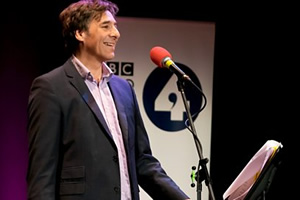
Mark Steel's In Town
- Radio stand-up
- BBC Radio 4
- 2009 - 2024
- 73 episodes (13 series)
Mark Steel visits a town in Britain and investigates its society & history before performing a bespoke stand-up show for locals.
- Due to return for Series 14
Episode menu
Series 2, Episode 5 - Gateshead
Further details
This week, Mark is at the Old Town Hall in Gateshead, Tyne and Wear, where he learns that the most important thing about the town is that it is definitely NOT Newcastle.
Amongst the interesting things you come across in the town is the local underground system, which is not called the "Underground" like it is in southern city of London, but the "Metro" as if Gateshead is at one with Paris.
Mark talks about the local regeneration that is taking place in the town, including the Baltic Art Gallery which is built in an old flour mill. When Mark visited it, he came across a chemist in the gallery, which turned out to be an exhibit by Damien Hurst called "The Pharmacy". When Mark touched it a guard came up to ordering him not to touch the art, which was worth £10,000,000.
One of the more unusual buildings in the town is a car park in the middle of nowhere. Everything else has been demolished around it so the car park is of no use, but it is still standing because local campaigners believe it is important culturally. This car park which was used in the famous murder scene in the film Get Carter. The car park was chosen for the film because it was suitably grim.
Another building due to go is the Dunston Rocket, which is a block of flats shaped like a rocket and that was terrible to live in. Dunston was also where Paul Gascoigne was brought up.
Mark then looks at the town's early struggles. He talks about the time in 1831 Gateshead applied to be represented by its own member of parliament, but the Marquis of Londonderry refused claiming Gateshead was just a suburb of Newcastle. Meanwhile, J. B. Priestly wrote in 1934 that, "no truth civilization could have produced such a town."
Mark learns that it is Gateshead and not Newcastle which is the home to the Blaydon Races, a famous horse race which also lead to the creation of the unofficial Geordie National Anthem. The Blaydon Races last took place in 1916, where there was riot following a disqualification of a horse. This was not the town's first case of violence. In 1080 the people burned down a church with the bishop of Durham inside it.
In 1552 an Act of Parliament was passed to annex Gateshead to Newcastle. In response the locals claimed that their side of the River Tyne was cleaner that the Newcastle side. Local disputes as to the Newcastle/Gateshead border still go on, with Gateshead County Council claiming that the Millennium Bridge is 100% Gateshead.
One unusual thing about Gateshead was its technological history. Coal mining started in the 1300s and it is claimed to have the oldest railway line in the world which is still going, the Tanfield Railway, dating from the 1620s.
Probably the biggest Gateshead name in the 1800s was Harry Clasper, a man who revolutionised rowing. When he died, 130,000 people turned up to his funeral. Clasper won the Thames Regatta seven times, was world cox four champion which he won in a boat with his three brothers, redesigned the hull so it came into contact with the water less, and pioneered the idea of sliding your legs to help propel the boat.
Mark then looks at the history of drinking in the town, its failed temperance movement, and decides to visit one of the local pubs on the high street, which is an interesting experience for him.
Since Victorian times, Gateshead has also had a large Jewish community, but it had problems when it began. When the founder of the community set up his own synagogue the Chief Rabbi of Britain told him they were not important enough to be independent, that they had to be part of the Newcastle synagogue, and he refused to give them a Sefer Torah, which is a scroll used in an official service. In response, the Gateshead branch brought one in secret and kept it in a draw.
Mark then talks about Gateshead's most famous landmark: The Angel of the North. Mark claims that it feels approachable. He talks about the amount of concrete needed to prevent the statue subsiding, which is a good thing for something so large.
Mark finishes by talking about his favourite barman, who came from Gateshead. He was at a champagne bar and Mark ordered some. When the barman got the menu he exclaimed: "Are you sure, like? Have you seen the prices?"
Broadcast details
- Date
- Wednesday 5th May 2010
- Time
- 6:30pm
- Channel
- BBC Radio 4
- Length
- 30 minutes
Cast & crew
| Mark Steel | Host / Presenter |
| Mark Steel | Writer |
| Pete Sinclair | Writer (Additional Material) |
| Julia McKenzie | Producer |
